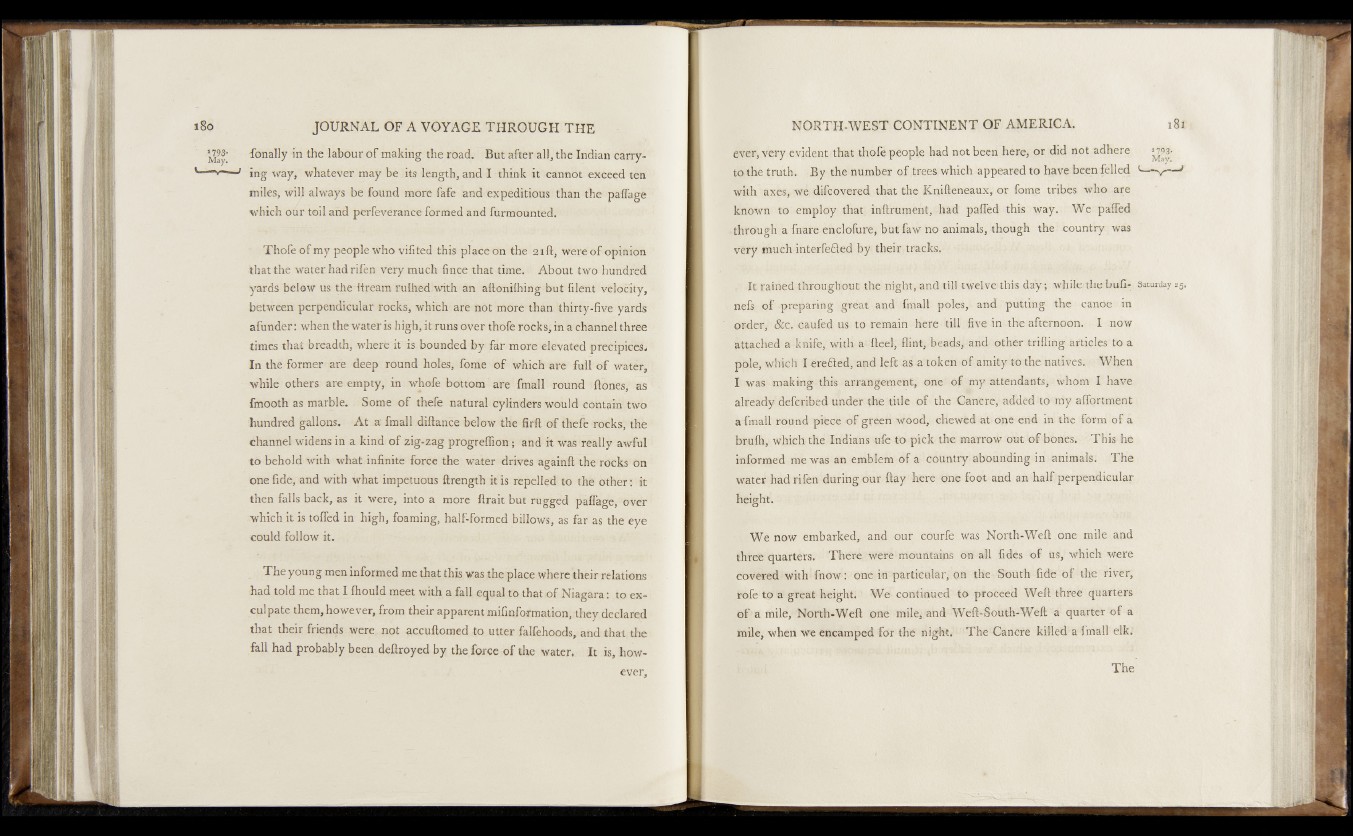
-fonally in the labour o f making the road. But after all, the Indian carrying
way, whatever may be its length, and I think it cannot exceed ten
mileSj WïlJ always be foundmore fafe andexpeditious than the paffage
which our toil and perfevdrance formed and furmounted^« *■
i Thofe of my people who vifited this place on the 21ft, were oftopiuion
that the water had rifbn very much fince that time. ■ About two-hundred
yards below us the ftream rufhed with an aftonilhing-but fdent velocity,
between perpendicular rocks, which; areïiöt more than, :thirty-five yards
afunder: when the water ishigh, itsruns o ver theft *rdèksi in a channel three
times thatbreadth, where iT'is,bounded b_y far more «élfevated precipices;
In the former^ahe deep round holes, fome of which are Mb o f water,
while others are empty, in whofe bottom * are - final! rodnd iftones/ as
finooth as marble. Some of thdfe natural cylinders would coataM1. two
hundred gallons. At a1 final! xfiftance below the firft of theffe -röeks, the
channel widens in a kind of zig-zag progreflion; and it was 'really awfol
tö behold with what infinite force the
©nefide,and with what impetuous ftrength it is repelled?to the other« it
then falls back, as it were, into a more ftrait but rugged paffage, over
which it is toffed in high, foaming, half-formed billows, as far-as the eye
could follow it. ,
The young men informed me that this, was the place where their relations
•had told me that I fhould meet with, a fall equal to that of Niagara: to exculpate
them, however, from their apparent mifinformation, they declared
that their friends were, not accuftomed to utter falfehoods, and: that the
fall had probably been deftroyed by the. force of the water. It is, however,
vëry evjdent-that thófé pëopïe had not been here, or did not adhere W93-
tothe frutb. By the number of (trees which appeared to have been felled (— -v--—*
with axis,, WÆ;difc0vered^dïat the Knifteneaux, or fome tribes who are
known to employ that; inftrument,*-had paffèdthis way. We pafled
through a fnare enclofure, but-faw no animals, though the’ country was
very much*interfe£led by; their-tràcks.
I It' rained throughout- the-night, and till twelve»thk day 5 whift/tbehuïl1,Sit^day
nefs: ©f-preparing great and” fraall poles,-- and putting the > canoe in
or*de*r^ &e.'oâufed us to remain -here till . fiveinMhe afteraoon, . I now
fetched':#ÉbW%yâth a dleeJv-flint, beadsÿ-and other trifling articles to a
I, was making-this arrangement, one' of my attendants^*whom- I have
already deftribed under the title ©fthe Cancre-» added to niy affort-menfc
afmall round pifec-e öf gféeh wood,- chew-fed at ope end in «he form of â
hrulhji which-the Indians ufe to pick the marrow out o f bones. This he
informed me was an emblem of a coUntry abOurtding in animals: The
water had rifen during ourftayhete one fost and an half perpendicular
height. ••
We now embarked, and our eôftrfe was . North-Weft one mile and
Ôfitib'iquàflàrs. - ' ; m o u nt ains OW »! fiées o f ab,’ which were
covered with*feow: ©nêiihq^tfeölar, ©n the-^^ÜOUth -fiêe 'bt the tóver,
hèfe to a great height;! Wefcontiou-ed to -proceed Weft thteb quarters
o f 1 a mile,)!?North-Weft one mile,-.and Weïh-âoÉftb^Wéft à quarter o f a
mile, when we encamped for the night. 1 The Cancre killed a fman elk.’
The